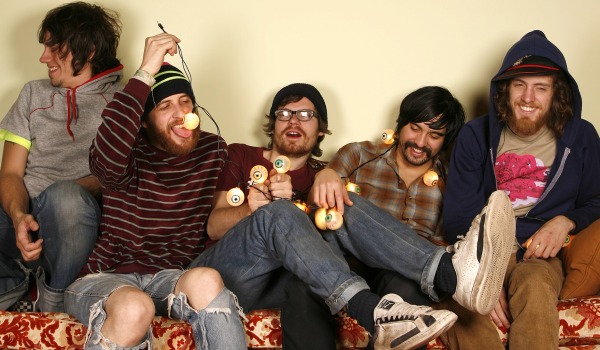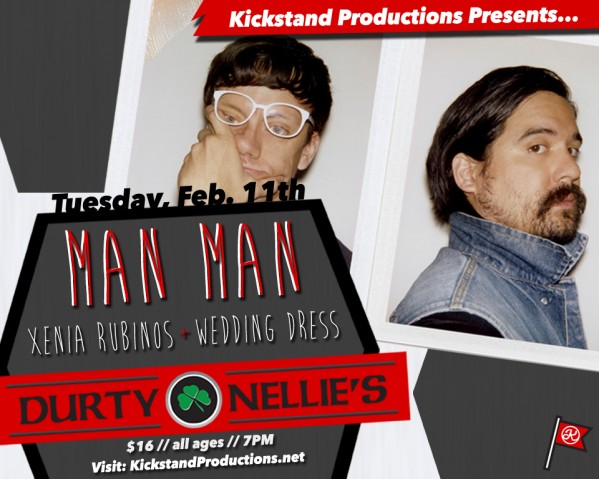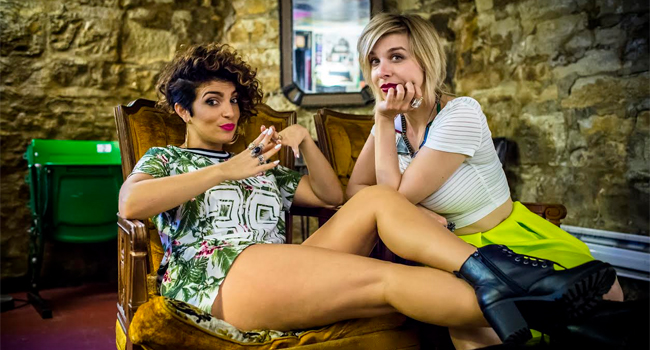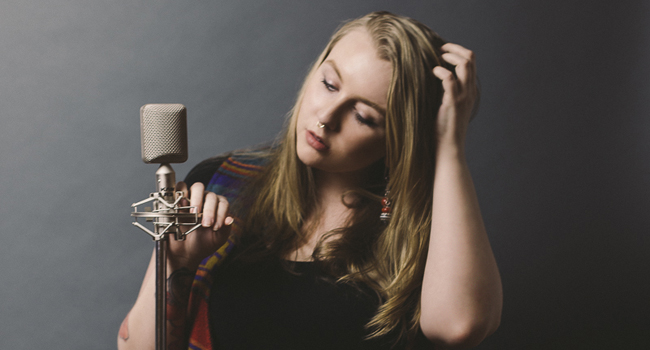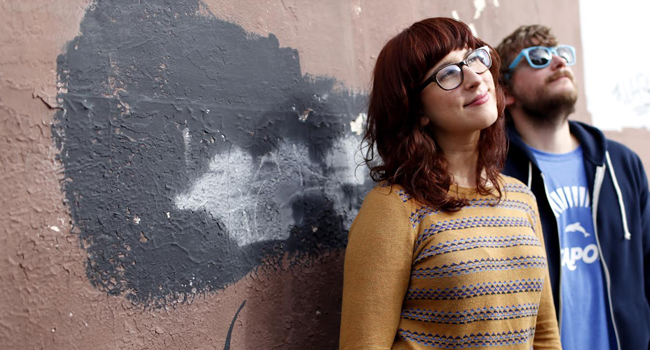Man Man frontman Ryan Kattner, known to his fans by his stage name Honus Honus, never had any real plans to start a band. He thought he would just play music on the side until he moved from Philadelphia, where he went to college, to Los Angeles to pursue film.
Eleven years and five albums later, Kattner’s side project has evolved into a full-blown, full-time band with a dedicated fanbase and a reputation for delivering wild, sweaty, screaming shows full of bouncing stage antics and almost boundless energy. The band recently kicked off its tour for latest album, On Oni Pond, which was released in September.
Pop ‘stache: So you were born in Texas? When did you end up in Pennsylvania?
Honus Honus: I was conceived and birthed in Texas, yes. I’m a Texan. I went to Pennsylvania after bouncing around the US and the globe growing up. I went to college in Philly at The University of the Arts. It was going to be my two year stomp on the way to film school at NYU, but after two years in Philly, I just didn’t go up there. I got stuck in Philly. There’s worse places to get stuck, though. I like Philly. It definitely got into my blood.
P’s: Where do you live when you’re not touring?
HH: I’m living in Los Angeles right now. I’ve tried to live there off and on for forever. It’s initially where I wanted to go after school and I kind of got sidetracked, because I made an ill-advised decision to start a band. [Laughs.] And then I kept telling myself, “When my band’s successful, then I’ll move out there.” I kept telling myself that, year and after year, and then I just decided to move out there. I finally came to terms with my own mortality. It’s funny, because all of my friends moved West after school and they all have great careers now and stable lives, and I’m just a wandering nomad.
P’s: So even after so many years of putting out albums and playing shows, you don’t feel like it’s any more stable of a lifestyle?
HH: No, definitely not. If we were a band that had gold records then sure, there would be a little bit more stability. We’re fortunate enough that we’ve been able to keep doing our own thing for so long, and hopefully it can continue to be sustainable. It’s such a fickle ADD universe out there right now. The good thing about the new record is that we’ve been able to perk up some new ears, because it’s kind of a different direction for us. It’s cool to have kids come up and be almost apologetic in a way, like, ‘Oh my god, I’m so sorry it took me this long to discover you, but I’m glad I did.’ That means a lot, because it means that at least we’re still an active band.
P’s: What’s it like being on the road so often?
HH: Well, my favorite part of touring is when you hit that point around week three or four, when you just snap. And everybody fucking snaps, they lose it. But once you can muscle through that, you’re golden. You could tour forever, because you reach a point where you’re like, “OK. I don’t give a fuck, nothing can bother me. Oh, we’re stuck in traffic now for eight hours, and it was supposed to be a two hour trip? Who cares.”
The way I deal with it is: you’ve spent all day traveling so you can explode on stage for an hour or so. When I see bands perform who are lethargic and too cool for school, and it’s just the same plodding, middle-of-the-road tempo—I couldn’t even fathom doing that. I don’t know why you would spend all that time on the road traveling to play that kind of show.
P’s: Has performing onstage always felt natural for you?
HH: I stumbled into music as a therapeutic outlet to deal with my crazy younger self. If I wasn’t making music and being able to freak out onstage, then I was doing whatever I could to self-implode. If I didn’t have that outlet, then things would have been much darker.
I didn’t even play music or have any bands before Man Man. It was my first band. I didn’t realize how lucky we were, audience-wise, until I played in a side project a couple years ago, Mister Heavenly. The audiences we played to were great audiences, because they came out, but they weren’t as crazy and wild as the Man Man audience. It made me really respect and miss that.
There were some kids last night who have seen us seven or eight times. Usually when I hear that, my first question is, “Are you OK?” Then my second question is, “Were we OK tonight? Was this the show that is going to make you never come back again?” And that’s just me being self-deprecating, but there was this kid at a show last time who told me that he had read that our last record, Life Fantastic, hadn’t been very well-received, and he wanted me to know that it had meant a lot to him and helped him through a really difficult time.
So my reaction aside from, “Thank you, I really appreciate that,” was, “Are you OK? That’s a pretty dark record.”
P’s: When you do hear negative reactions from critics about your music, do you guys take that stuff to heart when you’re making the next record or just focus on what you’re doing?
HH: Well, Life Fantastic was made in a creative environment that was just the worst, the most counter-creative environment to be in, with just interpersonal stuff and other things. That’s what we took to heart when we made this last record, On Oni Pond. I didn’t have it in me to do that again, and I wouldn’t create in that kind of environment again. So we didn’t, and we ended up with what I think is a pretty joyful, exuberant record, which is refreshing.
But at the same time, when we’re working on new material, there really aren’t any guidelines. If we’re working on a song that sounds like a calypso song mashed up with a rap, rock song, god forbid, you know, we’ll still chase that idea down the rabbit hole and wherever it may lead, because we know that ultimately, we’ll make it our own.
P’s: It seems a lot of people have a hard time describing your music. Is there a label you hate hearing over and over again?
HH: The strange label we get is “experimental.” I like experimental music, but ultimately I feel like maybe that puts people off. They read “experimental” and they don’t even investigate it, and then we’ve lost someone who could potentially really like what we do.
There’s not too much experimental music that I’ve ever heard in my lifetime that has hooks and is catchy. I feel like experimental music, for the most part, is kind of the antithesis of writing catchy songs. I don’t know why we got slapped with that tag. If anything, we’ll experiment with the idea of what a song can be, and maybe that can be challenging for some people who are just used to four on the floor rock music that they’ve been hearing for the last fifty years, recycled.
It’s just strange, because I’ve been trying to write the perfect pop song since day one. I guess I just fell on my head too many times as a child.
I never thought that being difficult to categorize could work against you. I know better now. But at the same time, it’s not going to stop us from just doing what we do. It’s really just about creating a language, and if people want to learn it, then they do, and then if they don’t, there’s a lot of other things they could do with their lives than listen to a weird band.
P’s: This is your first band, but how long have you been singing?
HH: I became the singer of the band by accidentally, a lot by default. When I first started with this other guy—I won’t say his name—we started the band and we didn’t have a drummer, so he decided he would play drums until we could find one, and I decided I would sing until we could find a singer. Originally we wanted a girl to front our band. So the idea was, “Okay, I’ll just sing until we can find someone, and you’ll drum until we can find a drummer.” Then we got stuck in our roles.
Then the entire band quit between record one and two. I thought the band would just be a one-off deal, and then I’d get on with my life, but then the whole band quit and I got that really shitty feeling like, “I’ll show them! I’ll keep doing it! I’ll prove them wrong!” And now here I am, with On Oni Pond.
P’s: So you never thought of yourself as a singer?
HH: Oh no. God no.
P’s: You have such a specific voice and style. Did you have to train yourself to sing when you started?
HH: It was actually kind of the opposite. I thought that at the most we’d make one record, and then implode. And we did implode after one record, but I just kept it going. So all the songs on the first record, I was just consciously trying to destroy my voice, just screaming. I’ve lost ranges because of that first record. I thought that maybe it would be the only opportunity I would ever get to make a record, so I might as well let it all hang out and kind of just go for it and sing it how I felt it. Consequently, the songs off the first album are the hardest songs to sing now.
P’s: And how’s that been on you physically?
HH: Well, like with anything, if you don’t know what you’re doing, you’ll eventually start to figure it out. I know the hardest thing for someone who is starting out playing music or singing is that it can be hard on your voice, but for me, it was in that act of destroying my voice that I was able to find my voice and figure out the nuances of how to use it. But I’m still convinced if we can get someone with a better voice to cover “Head On (Hold On To Your Heart)” we’ll do it. So if you have any connections to Cher…
P’s: I don’t, sadly. I’m not going to be your Cher connection.
HH: Dammit. That song is the one instance where I think the founding mentality of Man Man, wanting a female singer, could work if we found a beautiful female voice to do that song. I just really want that song to get out there. I want people to hear it.
P’s: It’s a very uplifting, positive song. It has an anthemic quality to it.
HH: Yeah. It’s interesting, because it took this long journey to arrive at a destination that made it possible for that kind of song to come out of the ether and land in my chest. I don’t think I could have written that song on the first record.
P‘s: You’ve before that songwriting wasn’t something you necessarily wanted to do, rather it was something you “had” to do, because it fell to you, like singing. Has that gotten better since you started?
HH: Oh, it still sucks. [Laughs.] It does suck. I still dread it. I’m not prolific. I wish I could write. It’s like moving a mountain to just get enough songs for an album. I wish I could just show up and have sixty songs. It’s just not the way my creative brain works. Unfortunately, it’s one of those things where even if it’s a song that is kind of an absurdist story, it has to be lived in for me. But at the end of the day, it’s just songs, and I’ve just got a band. I’m not solving the cure for cancer.
P’s: It can be good to hear from artists that the creative process is difficult and not just this thing that comes to everyone in a natural and magical way.
HH: I wish. My friend Nick is in Islands, and he’s in Mister Heavenly with me—like, that motherfucker is prolific. I hate his guts. I love working with him, but I can’t write as quick as he does. I try. When we were working on On Oni Pond, we had about two months to write for the record, and I had about a month and a half to myself for those two months. I had a painter friend who let me use his house during the day, so I’d go there and do eight hours of just showing up and staring at a piano and just banging on it and trying to get something. It’s like getting blood from a stone, you know? You really just have to put in the time.
If you play music and you’re not in a highly, commercially successful band—for the most part, we’re an underground band, and we’d like to be able to get out of that—
you’re constantly looking over your shoulder, because it could be over as soon as you stop. You just have to stay busy, and you have to stay hungry.
P ‘s: Well that’s great to hear, in a way.
HH: It’s great to how frustrating it can be?
P‘s: Well, not for you obviously, but it’s nice to hear that the creative process is hard for everyone.
HH: Yeah. Some people have it better, unfortunately I’m like an impostor musician so it’s a little more difficult for me.
P ‘s: You’re a fairly good impostor. It’s convincing, the act you have going.
HH: Yeah. It’s like the Wizard of Oz.
Man Man will be playing an all ages show at Durty Nellie’s in Palatine with Xenia Rubinos and Wedding Dress on Tuesday, Feb. 11.
